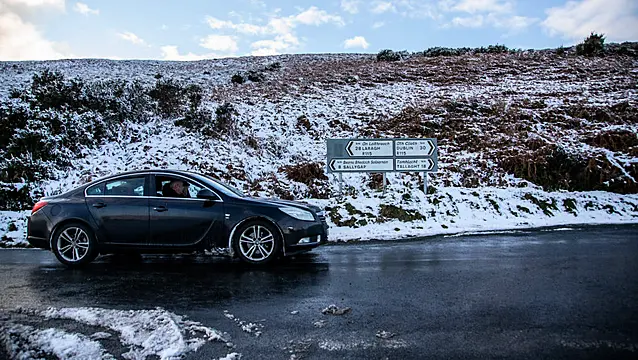Winter brings with it a new set of driving challenges, from bad weather conditions to icy and slippy roads.
Making sure your car is ready for the winter weather and driving conditions is the most important thing as we prepare for the evenings to get shorter and the days to get colder.
This is according to David Martin of the Road Safety Authority (RSA), who said the agency urges motorists to get their vehicles serviced before the winter arrives to make sure they are ready for "all winter conditions".
"We particularly want them to look at their tyres because, talking to our friends over at the NCT, tyres account for a huge number of NCT failures," Martin said.
"People just don’t realise that their tyres are in bad nick. If you have a bald tyre, it could be potentially fatal for you."
There have been 138 road deaths so far this year, up two on the same time last year.
“People don’t check their tyres and they are so important. You’ve got to check your tyres and your spare, of course, because if they’re in bad nick you’re in big trouble. Particularly in wet conditions and icy snowy conditions. We advise people to get that done before winter really sets in."
Ahead of Irish Road Safety Week, taking place from October 7th to 13th, Irish Tyre Industry Association (ITIA) members around Ireland are inviting all motorists to call in for a free tyre pressure check and thread depth inspection.
A visit to the ITIA website will lead motorists to their nearest ITIA registered dealer.
Winter road safety
Wind and rain pose challenges to motorists during the winter, Martin said, and there are a few things to keep an eye out for and be careful about.
“First of all, we get a lot of localised flooding, particularly on rural roads. We always advise people just to turn around and never drive through them, because they could be a lot deeper than you anticipate," he said.
"There's another challenge from wind and rain as well. When you're driving on motorways and dual carriageways, you get the risk of aquaplaning. We always advise people to drive slowly and keep a long safe distance between them and the car in front.
"The other thing, of course, is frost and snow. We always get a little bit of frost in the December, January, February time frame, which makes driving quite treacherous in those conditions.
"Again, the safest thing to do is to slow right down and just be super careful when you're braking and always look out for black ice as well."
Martin urged motorists driving in bad weather and road conditions to check and be informed of the weather to see what changes are expected to traffic and road conditions.
"Don’t take any chances, maybe postpone your journey until the weather and traffic conditions improve," he said.
“Be aware of dipped headlights. You don’t want to be blinding people during those winter months with your headlights on full, but some people do inadvertently.
"Speed is another key thing, there’s a number of killer behaviours which can result in fatalities and injuries on the roads. People using a mobile phone is another big one, there’s obviously more and more of that and there’s also the usual one of drink-driving and, more recently, drug driving.
"Some people still don’t put on their seatbelt, particularly passengers. You’re at serious risk of bad injury if you don’t have your seatbelt on.”
Pedestrians, particularly older pedestrians, appear to be disproportionately at risk of injury or death during the winter months.
“We were just doing an analysis of pedestrians and what we’ve seen is an increase in pedestrian injuries and fatalities in the winter months, like October, November, December," Martin said.
"We see a spike in those every year, and it is because of the conditions and the fact that it’s darker, they’re less visible. We are always advising drivers to be super aware of pedestrians out walking during the winter months.
"Particularly older pedestrians, people aged 75 and older, account for a disproportionate number of fatalities.”
As part of Irish Road Safety Week, on October 8th the RSA will reveal new research into fatalities and serious injuries amongst pedestrians up to 2023.







